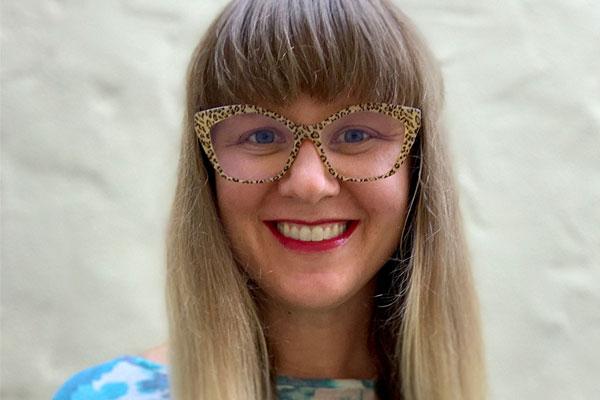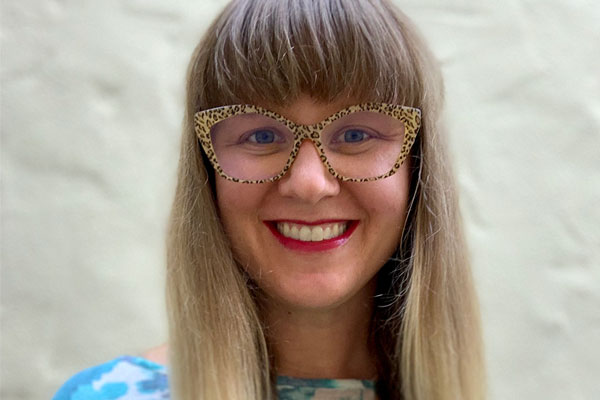

Kate Oppegaard has been caring for those impacted by cancer for more than a decade. She sees herself as a “force for calm and peace,” settling these patients when fear, anger or confusion – or sometimes all three – set in.
She was a different kind of force Sept. 22-24, joining more than 100 of her peers for the Oncology Nursing Society’s Capitol Hill Days in Washington, D.C. Oppegaard, an assistant unit manager at Marin Health Medical Center, discusses her experience in Washington D.C., why she chose UCSF to pursue her master’s degree, and where she envisions her career heading.
Name: Kate Oppegaard
Age: 37
Hometown: Vancouver, Wash.
Program and Specialty: Master of Science Program, in the Adult-Gerontology Clinical Nurse Specialist — Oncology specialty
What motivated you to become a nurse?
I have always wanted to make people feel better. I can remember as early as kindergarten sensing someone in the room needed something, so I’d try to help them. My mom was also a nurse for 34 years. I have fond memories of how much she loved her patients, and so I am not surprised I went in that direction.
Why are you pursuing your master’s degree in nursing at UCSF? Why is now the right time in your career?
For the first 10 years of my career, I was learning a lot at work, paying off my expensive bachelor’s, and using my free time to enjoy the Bay Area and travel the world. Then, I started to get a little itchy so I joined some committees, earned a few certifications, and sought promotion. Then, I started to wonder what else was possible for me. I knew I needed to put myself in a new environment. UCSF was a perfect fit. I only wanted to do a program that was in-person. They had an oncology-focused degree that was advanced practice but not nurse practitioner, and the human genomics electives sounded really interesting.
What have you learned thus far in your master’s studies that you’ve practically applied to your career?
New language! I have new vocabulary for diseases and treatments, new ways to talk to patients, and new ways to interact with colleagues. I have increased confidence to encourage others to be mindful of their own language and why it matters. Also, I am able to better articulate what I hope to contribute to my profession, and how I hope to impact people’s lives.
You were promoted to a managerial position in your unit two years ago. Has your perspective on nursing changed at all? Do you view certain issues/duties differently as a manager?
My role is the assistant unit manager, so I am the shift leader. It has been a great fit for me because I am still able to work 12-hour shifts and am in and out of patient rooms all day, but I have had an opportunity to participate in things like leadership development classes, interviews, evaluations and budget meetings. I have a much better sense of the systems that exist within an organization, which is essential as a CNS. I have gained an enormous amount of appreciation for all of my colleagues and what it takes to keep a hospital going!
Why have patients who are older and patients with cancer had such an impact on you as a nurse? Is that why you’re pursuing the Adult-Gerontology/Oncology specialty?
I have been so fortunate to work at Marin Health Medical Center (formerly Marin General Hospital) for nearly 14 years. The population there often brings patients well into their 90s and older. These people have seen and experienced things I will never fully understand. I just enjoy being in their presence and having an opportunity to help them. As far as patients with cancer, that is where I have always felt the most natural as a nurse. I am drawn to them. Even the word cancer makes people uncomfortable; it is heavy. I like to get in there with people who are going through it and be a force for calm and peace.
You spent the past few days in Washington D.C., advocating on behalf of nurses and patients. What issues did you emphasize to policymakers and why are they important?
All nurses know about our Code of Ethics; less known is our Social Policy Statement. It is a rich and complex document that explicitly states a nurse’s duty to heal those things that are often the root cause of illness — social and political norms and inequities. With that in mind, I was so excited to have this opportunity to learn how to be impactful in Washington alongside the Oncology Nursing Society! We advocated for palliative care and hospice education, parity for oral cancer therapies, coverage for lymphedema treatment, and funding for research and grants to address the vaping epidemic. Lawmakers need to hear from the people their policies directly impact so our presence there was vital.
You were one of only eight master’s students in the nation to receive a scholarship from Nurses Education Funds, Inc. What does it mean to you to receive this scholarship?
This organization has been dedicated to advancing nursing graduate level education for 100 years! To be included in their “Circle of Scholars” and be awarded a scholarship in the name of a trailblazing nurse, Mathy Mezey, is beyond words. To know that this network of people believes in me is both humbling and motivating. It is also a reminder to ensure I uplift and support others on their journeys because it makes a difference.
What are your career aspirations after you complete your studies at UCSF?
I learn new things with every passing week so my career vision evolves. And since I, thankfully, have an entire academic year left, there will be much more to integrate into my career aspirations. That being said, there are a few things I know for sure. I want to be involved in the advances in genetics and genomics as they relate to cancer. I want to bring more attention to that fact that people of color have far less favorable outcomes with cancer than white patients do and help eliminate this disparity. And, I want to challenge the status quo and align myself with others who do the same.
